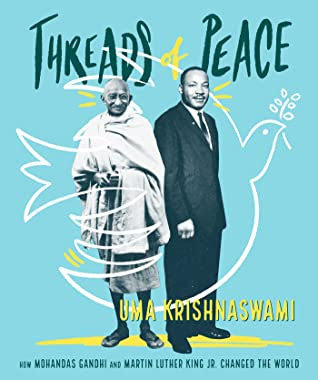Threads of Peace:
How Mohandas Gandhi and Martin Luther King Jr. Change the World
written by Uma Krishnaswami
Caitlyn Dlouhy Books/Atheneum, 2021, 336 pages
Publisher's Summary:
Mahatma Gandhi and Reverend Martin Luther King Jr. both shook, and changed, the world, in their quest for peace among all people, but what threads connected these great activists together in their shared goal of social revolution?
A lawyer and activist, tiny in stature with giant ideas, in British-ruled India at the beginning of the 20th century.
A minister from Georgia with a thunderous voice and hopes for peace at the height of the civil rights movement in America.
Born more than a half-century apart, with seemingly little in common except one shared wish, both would go on to become icons of peaceful resistance and human decency. Both preached love for all human beings, regardless of race or religion. Both believed that freedom and justice were won by not one, but by many. Both men met their ends in the most unpeaceful of ways - assassination.
But what led them down the path of peace? How did their experiences parallel...and diverge? Threads of Peace keenly examines and celebrates these extraordinary activists' lives, the thread that connect them, and the threads of peace they laid throughout the world for us to pick up and weave together.
My Thoughts:
I always knew that Martin Luther King Jr. use of civil disobedience during the Civil Rights Movement was influenced by Mahatma Gandhi, but that was pretty much it. Reading Uma Krishnaswami's new book about these two great men made me realize how little I actually knew about either one of them and just how extensive their impact on the world was and still is. As young men, both Gandhi and Martin Luther King Jr. faced similar instances of racial discrimination that led them into a peaceful fight for equality for all people.
As part of the merchant caste in Hindu society, Gandhi was able to go to school and get a good education. And following tradition, his married a 13 year-old girl named Kasturba in a union that had been arranged by his parents. Ironically, it may been the headstong Kasturba who first planted the seeds of passive resistance in his mind when she quietly refused to bend to his authoritarian demands that she obey him unquestioningly. Later, Gandhi's ideas about nonviolence may have been further influenced after reading Civil Disobedience by Henry David Thoreau while imprisoned in South Africa for urging passive resistance to the ruling British among working Indians who were required by the 1906 Asiatic Registration Act to be fingerprinted and carry registration cards or be deported. He called this "passive resistance strategy satyagraha or holding fast to truth." (pg 67)
 |
| Protesters March in Transvall (pg71) |
Martin Luther King Jr. grew up in the south, in a world divided into white and "colored." At a young age, Martin learned to stay away from angry white people, but it was Martin's father who refused to accept the discriminatory system under which they were forced to live, imparting the values of dignity, self-respect and resistance to injustice that became guiding principles in Martin's life. Later, studying to become a minister, Martin began to read Walter Rauschenbusch, a theologian who believed that not just people's souls should be ministered to, but their bodies as well. Martin realized that he also needed to be concerned with unemployment, living conditions and economic insecurity in the lives of America's marginalized populations. Another influence was J.J. Muste, activist and clergyman, who believed in pacifism and peacefully resisting injustice. "Could nonviolent resistance ever be practical?" Martin wondered. (pg 135)
 |
| March to Montgomery (pgs 256-7) |
The first section of Threads of Peace is devoted to Gandhi and his life, the second section covers the life of MLK Jr, but it is the third section that is so difficult to read as it cover the assassination of both men. But, as Krishnaswami shows, their untimely deaths hardly cut the threads to peace and equality that both men had worked so hard for during their lifetimes.
 |
| Click to Enlarge |
Meet the Author: Uma Krishnaswami
Uma was born in New Delhi, India and now lives in British Columbia, Canada.
To learn more, visit her website: umakrishnaswami.com or her Facebook page: umakrishnaswami.author
Praise for Threads of Peace:
★ “Krishnaswami’s comprehensive yet accessible text, complemented by intriguing, lesser-known facts, traces the life of each man, from his formative years to his rise as an influential leader to the untimely assassinations that cut both lives short…. A reflective presentation that will inspire young peacemakers.” —Booklist (starred)
★“The book’s attractive design, lucid text, and carefully chosen details combine to create an inviting and original treatment of its subjects. History has been carefully intertwined with the present in this engaging and reflective book.” —Kirkus Reviews (starred)




































No comments:
Post a Comment